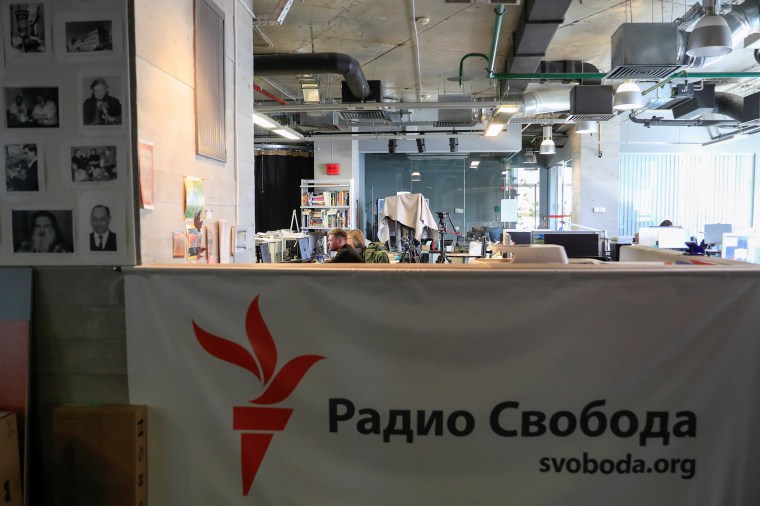New York, May 17, 2021 – Russian authorities should unfreeze the accounts of Radio Free Europe/Radio Liberty and cease labeling outlets as “foreign agents,” the Committee to Protect Journalists said today.
On May 14, Russian authorities froze the local bank accounts of the U.S. Congress-funded broadcaster Radio Free Europe/Radio Liberty for allegedly failing to pay fines issued for noncompliance with the country’s foreign agents law, according to news reports and Kiryl Sukhotski, RFE/RL’s regional director for Europe and TV production, who spoke with CPJ in a phone interview.
Separately that day, the Russian Justice Ministry added Stichting 2 Oktober, a Dutch journalism nonprofit that administers the independent news website VTimes, to its list of foreign agents, according to news reports and the Justice Ministry’s website.
“Russian authorities should cease fining and harassing news outlets for alleged violations of its foreign agents law—an unjust piece of legislation that should be repealed,” said Gulnoza Said, CPJ’s Europe and Central Asia program coordinator. “Radio Free Europe/Radio Liberty should be able to access its resources freely, and websites such as VTimes should not be forced to jump through hoops and risk large fines due to their ownership structures.”
Two bailiffs from the Moscow department of the Court Bailiff System of Russia, the law enforcement arm of the Ministry of Justice, visited RFE/RL’s Moscow office on May 14 and served its staff a document saying that its accounts would be frozen over the outlet’s alleged failure to pay 5 million rubles (US $67,650) in fines, according to those reports and Sukhotski, who said that that sum represented only a small portion of the total fines the outlet is facing.
The bailiffs said they would conduct an inventory of the office’s equipment, but did not do so at the time; they did not interfere with the work of journalists at the office, Sukhotski told CPJ.
Later that day, RFE/RL’s bank accounts in Russia were frozen, Sukhotski said, adding that, because the accounts did not hold 5 million rubles, he feared that authorities could confiscate the broadcaster’s equipment to satisfy the fines.
In January, the country’s media regulator, Roskomnadzor, began issuing notices to media outlets run by RFE/RL, accusing them of violating the foreign agents law by failing to label their content as “foreign agent-produced,” as CPJ documented at the time. As of today, RFE/RL faces 520 separate fines totaling to $2,400,000, according to Sukhotski.
Sukhotski told CPJ that 158 fines were revoked on April 16 over a court technicality, but the majority have been re-filed and re-imposed. Also in April, RFE/RL’s Moscow bureau filed a suit against Russia at the European Court of Human Rights, asking the court to stop the enforcement of those fines, according to a statement from the broadcaster.
Sukhotski described the fines as “a targeted attack against RFE/RL by Russian authorities,” and said they amounted to “political censorship and trying to introduce the Russian state into our editorial content.” He added that RFE/RL’s Russian correspondents felt nervous about working amid such restrictions, but said they were continuing their reporting.
Also on May 14, the Justice Ministry added the Netherlands-based foundation Stichting 2 Oktobe, which administers the domain of the Russian news website VTimes, to its list of foreign agents, thereby requiring VTimes to abide by the foreign agents law, according to news reports and VTimes publisher Aleksandr Gubskiy, who spoke with CPJ in a phone interview.
VTimes posted a statement that day saying it would pursue the issue with the Justice Ministry.
As of today, Russia’s list of foreign media agents includes independent media outlets Meduza and PASMI; several outlets operated by RFE/RL and the U.S. funded-broadcaster Voice of America; the Czech Republic-based outlet Medium Orient; and five individual RFE/RL journalists. The list includes 20 entries, following the addition of VTimes.
Imposed since 2017, the foreign agents law can require media organizations and individuals receiving foreign funding to have a legal representative in Russia, provide extensive reporting on their activities, and note their foreign agent status whenever they produce news or are mentioned in news articles.
Since 2017, the United States has also required a number of foreign-funded news organizations, including the Russian-funded outlet RT, to register under the U.S. Foreign Agent Registration Act, as CPJ has documented.
CPJ emailed Roskomnadzor and the Ministry of Justice for comment, but did not receive any responses.
